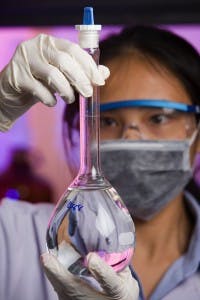As the market continues to climb, investors are beginning to see thinning dividend yields on many of their big pharma shares. But by sticking with quality – and with companies that are keeping their product pipelines full with new drugs – one can certainly find the key to not just share growth but also a nice steady income along the way.
Keeping yields healthy

One of the biggest focus areas for GlaxoSmithKline plc (ADR) (NYSE:GSK) has been with its GLP-1 agonists. This medication for patients who are suffering from diabetes claims to offer less risk to its users than some of the other related types of medication that are currently available on the market today. GlaxoSmithKline plc (ADR) (NYSE:GSK) has also recently gained acceptance by the U.S. FDA for its fluticasone furoate, a COPD, or Chronic Obstructive Pulmonary Disease-management drug application.
Although analysts expect GlaxoSmithKline plc (ADR) (NYSE:GSK)’s share price to rise by only 3% over the next 12 months, the $2.76 per share dividend payout is yielding investors approximately 6% annually.
In keeping with healthy dividend yields, investors may also want to consider Eli Lilly & Co. (NYSE:LLY). Here, too, is a big pharma company that focuses on the development, manufacturing, and sale of drugs for both humans and animals. The span of Eli Lilly & Co. (NYSE:LLY)’s market encompasses the U.S. and roughly 130 additional countries.
This company also has a strong presence in the diabetes-management area with its investigational med Dulaglutide. Other medications that Eli Lilly & Co. (NYSE:LLY) currently has in clinical testing include a depression drug called Edivoxetine and a new insulin glargine product.
Eli Lilly & Co. (NYSE:LLY)’s recent announcement about an agreement it has entered into with Qiagen has been well received in the industry and by investors. This program will work in the area of development and commercialization of companion diagnostics with drugs across numerous therapeutic areas using both investigational meds and those that have already been approved for use.
This particular agreement is intended to help build on the two firms’ previous work together, with a goal of unlocking various molecular information from patients. This information can then be further used in recommending more accurate treatment options for such patients.
Similar to GlaxoSmithKline plc (ADR) (NYSE:GSK), the share price of Eli Lilly & Co. (NYSE:LLY) is not anticipated to have any major upward movement over the next year. However, the company’s dividend payout of $1.96 per share provides a nice dividend yield of 3.7% to its shareholders.
Product pipeline
Not to be outdone, Bristol Myers Squibb Co. (NYSE:BMY) is also keeping its product pipeline full. One key area for this big pharma is its treatment for Hepatitis C. The company is currently working with three test medications – and recently these meds cleared up the Hepatitis C virus in nearly 100% of the test patients who tried it.
Presently, shares of Bristol Myers Squibb Co. (NYSE:BMY) are trading near their 52-week high, yet analysts are split on this stock in terms of Buy and Hold ratings. The company’s dividend payout of $1.40 per share equates to an annual dividend yield of 3.4%. Here too, then, investors may not see phenomenal share price growth, but will be paid nicely while they wait for growth opportunities.
With all three of these companies, the competition in the industry can be fierce. In some instances, the companies may work together in bringing a product to market, while collaborating in other situations may not be the best solution.
In determining potentially profitable big pharma stocks, investors should keep a sharp eye not just on earnings per share and current share price, but also any news regarding how product trials are faring, as this can literally make or break an investment – especially in the short run.
The bottom line
Oftentimes, a trial medication’s success or failure can substantially affect the share price of big pharmaceutical firms – moving it either up or down dramatically. But for those who are seeking stocks with nice steady dividend income, any of these three big pharmaceuticals can certainly do the job.
The article Are Dividend Yields the Cure for Pharma Investors’ Woes? originally appeared on Fool.com and is written by Nauman Aly.
Copyright © 1995 – 2013 The Motley Fool, LLC. All rights reserved. The Motley Fool has a disclosure policy.